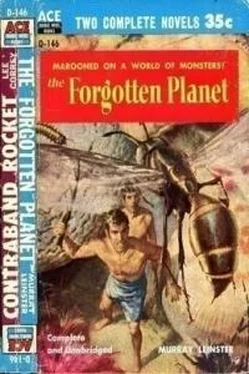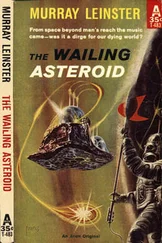Actually, there was a space a hundred feet by fifty on which wholly familiar mushrooms grew. It was a thicket like a detached section of the valley itself. Well–known edible fungi grew here. There were gray puffballs. And from it came the cheerful loud chirping of some small beetle, arrived at this spot nobody could possibly know how, but happily ensconsed in a separate bit of mushroom–jungle remote from the dangers of the valley. If it was small enough, it would even be safe from the reeking horror of the cañon just below it.
They broke off edible mushrooms here and ate. And this could have been safety for them—save for the giant millipede no more than half a mile below. Old Jon wheezed querulously that here was food and there was no need for them to go further, just now. Here was food….
Burl regarded him with knitted brows. Jon's reaction was natural enough. The tribesfolk had never tended to think for the future because it was impossible to make use of such planning. Even Burl could easily enough have accepted the fact that this was safety for the moment and food for the moment. But it happened that to settle down here until driven out would—and at this moment—have deprived him of the authority he had so recently learned to enjoy.
"You stay," he said haughtily, to Jon. "I go on, to a better place where nothing is to be feared at all!"
He held out his hand to Saya. He assailed the slope again, heading upward in the mist.
His tribe followed him. Dik and Tet, of course, because they were boys and Burl led on to high adventures in which so far nobody had been killed. Dor followed because—he being the strongest man in the tribe—he had thoughtfully realized that his strength was not as useful as Burl's brains and other qualities. Cori followed because she had children, and they were safer where Burl led than anywhere else. The others followed to avoid being left alone.
The procession toiled on and up. Presently Burl noticed that the air seemed clearer, here. It was not the misty, only half transparent stuff of the valley. He could see for miles to right and left. He realized the curvature of the mountain–face. But he could not see the valley. The mist hid that.
Suddenly he realized that he saw the cloud–bank overhead as an object. He had never thought of it specifically before. To him it had been simply the sky. Now he saw an indefinite lower surface which yet definitely hid the heights toward which he moved. He and his followers were less than a thousand feet below it. It appeared to Burl that presently he would run into an obstacle which would simply keep him from going any further. The idea was disheartening. But until it happened he obstinately climbed on.
He observed that the thing which was the sky did not stay still. It moved, though slowly. A little higher, he could see that there were parts of it which were actually lower than he was. They moved also, but they moved away from him as often as they moved toward him. He had no experience of any dangerous thing which did not leap at its victims. Therefore he was not afraid.
In fact, presently he noticed that the whiteness which was the cloud–layer seemed to retreat before him. He was pleased. Weak things like humans fled from enemies. Here was something which fled at his approach! His followers undoubtedly saw the same thing. Burl had killed spiders. He was a remarkable person. This unknown white stuff was afraid of him. Therefore it was wise to stay close to Burl. Burl found his vanity inflamed by the fact that always—even at its thickest—the white cloud–stuff never came nearer than some dozens of feet. He swaggered as he led his people up.
And presently there was brightness about them. It was a greater brightness than the tribesfolk had ever known. They knew daylight as a grayness in which one could see. Here was a brightness that shone. They were not accustomed to brightness.
They were not accustomed to silence, either. The noises of the valley were like all the noises of the lowlands. They had been in the ears of every one of the human beings since they could hear at all. They had gradually diminished as the valley dropped behind them. Now, in the radiant white mist which was the cloud–layer, there were no sounds at all, and the fact was suddenly startling.
They blinked in the brightness. When they spoke to each other, they spoke in whispers. The stone underfoot was not even lichen–covered, here. It was bare and bright and glistened with wetness. The light they experienced took on a golden tint. All of these things were utterly unparalleled, but the stillness was a hush instead of a menacing silence. The golden light could not possibly be associated with fear. The people of the forgotten planet felt, most likely, the sort of promise in this shining tranquility which before they had known only in dreams. But this was no dream.
They came up through the surface of a sea of mist, and they saw before them a shore of sunshine. They saw blue and sky and sunlight for the first time. The light smote their shins and brilliantly colored furry garments. It glittered in changing, ever–more–colorful flashes upon cloaks made of butterfly wings. It sparkled on the great lance carried by Burl in the lead, and the quite preposterous weapons borne by his followers.
The little party of twenty humans waded ashore through the last of the thinning white stuff which was cloud. They gazed about them with wondering, astonished eyes. The sky was blue. There was green grass. And again there was sound. It was the sound of wind blowing among trees, and of things living in the sunshine.
They heard insects, but they did not know what they heard. The shrill small musical whirrings; the high–pitched small cries which made an elfin melody everywhere,—these were totally strange. All things were new to their eyes, and an enormous exultation filled them. From deep–buried ancestral memories they somehow knew that what they saw was right, was normal, was appropriate and proper, and that this was the kind of world in which humans belonged, rather than the seething horror of the lowlands. They breathed clean air for the first time in many generations.
Burl shouted in his triumph, and his voice echoed among trees and hillsides.
It was time for the plateau to ring with the shouting of a man in triumph!
10
Men Climb Up to Savagery
They had food for days. They had brought mushroom from the isolated thicket not too far beneath the clouds. There were the ants that Dik and Tet had distributed grandly, and not all of which had been used to secure escape from the cañon of the millipede. Had they found other food immediately, they would have settled down comfortably in the fashion normal to creatures whose idea of bliss is a secure hiding–place and food on hand so they do not have to leave it. Somehow they believed that this high place of bright light and new colors was secure. But they had no hiding–place. And though they did accept with the unreasoning faith of children and savages that there were no enemies here, they still wanted one.
They found a cave. It was small, so that it would be crowded with all of them in it, but as it turned out, this was fortunate. At some time it had been occupied by some other creature, but the dirt which floored it had settled flat and showed no tracks. It retained faint traces of a smell which was unfamiliar but not unpleasing,—it held no connotation of danger. Ants stank of formic acid plus the musky odor of their particular city. One could identify not only the kind of ant, but its home city, by sniffing at an ant–trail. Spiders had their own hair–raising odor. The smell of a praying–mantis was acrid, and all beetles reeked of decay. And of course there were those bugs whose main defense was an effluvium which tended to strangle all but the smell's happy possessor. This faint smell in the cave was different. The humans thought vaguely that it might possibly be another kind of man.
Читать дальше







